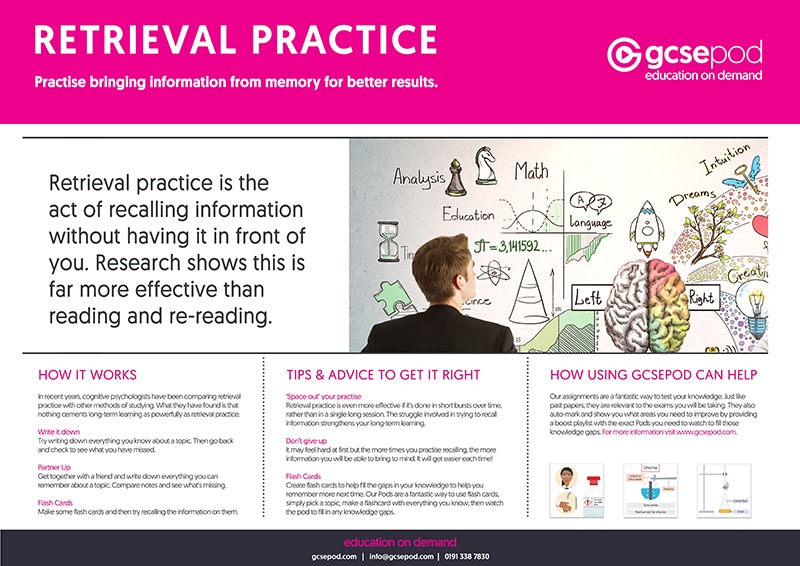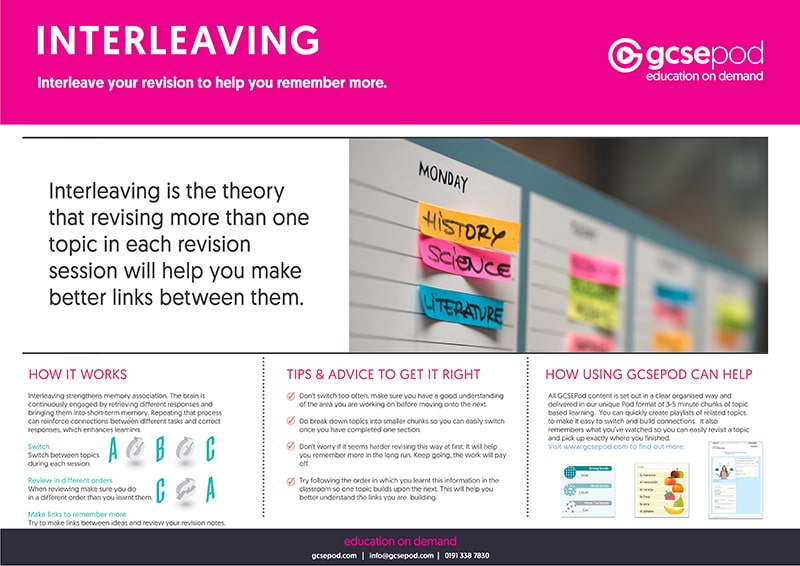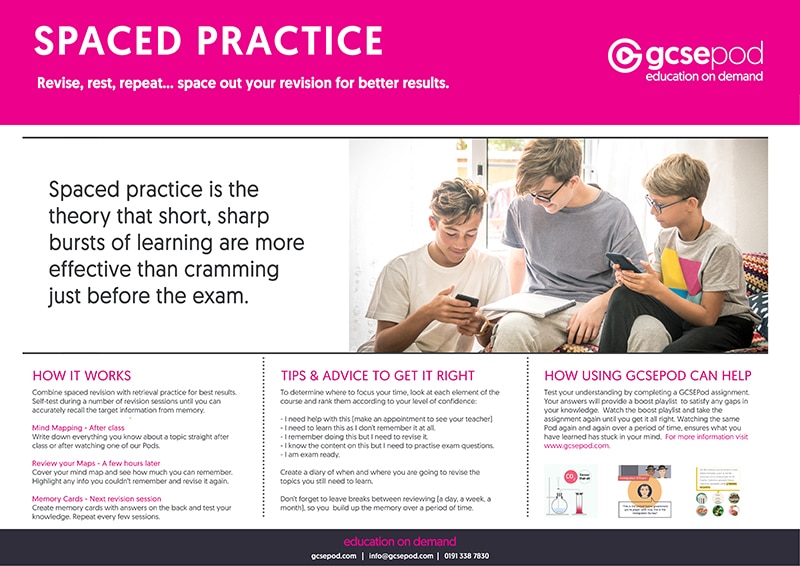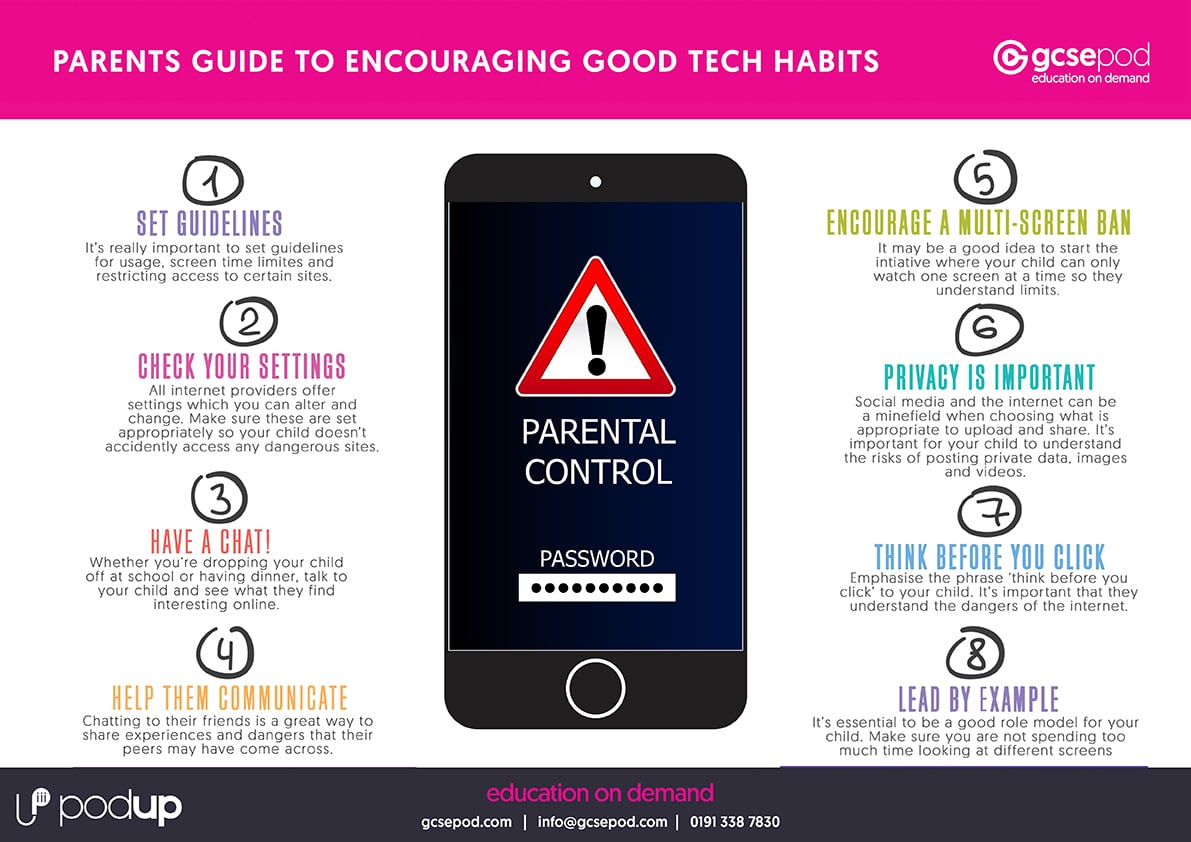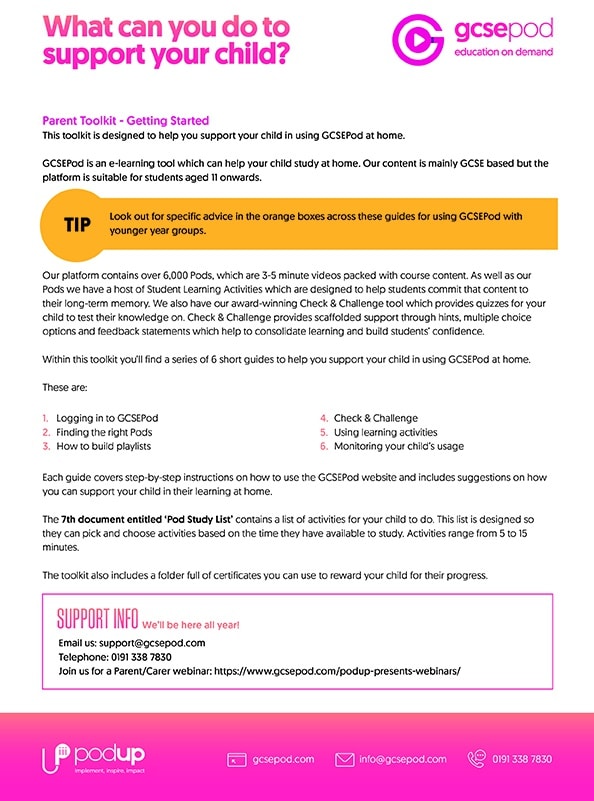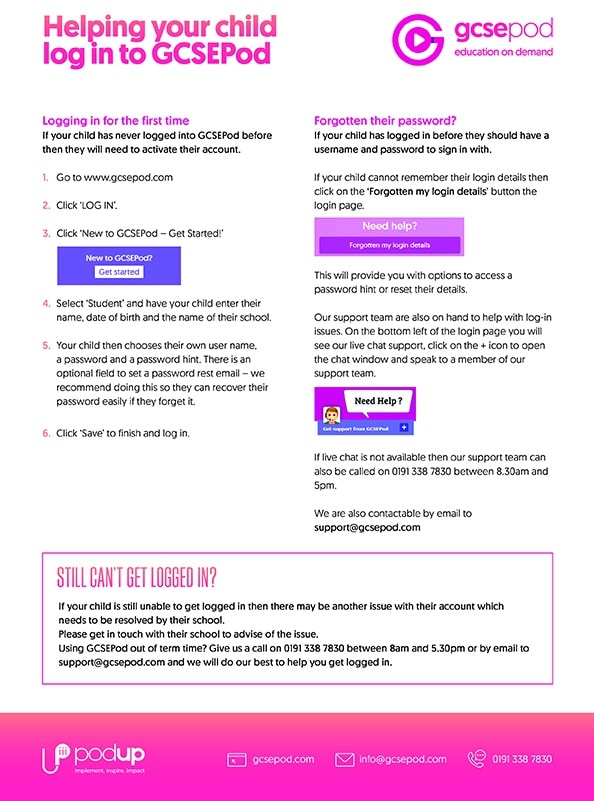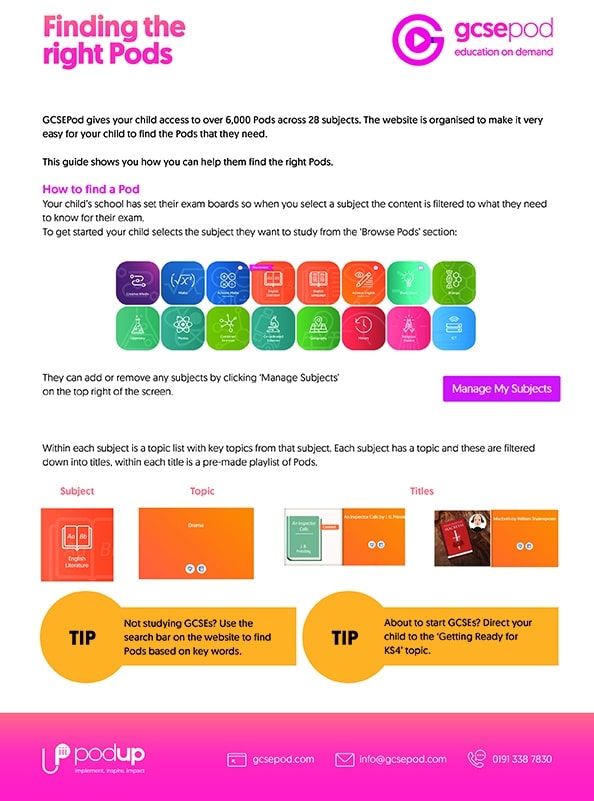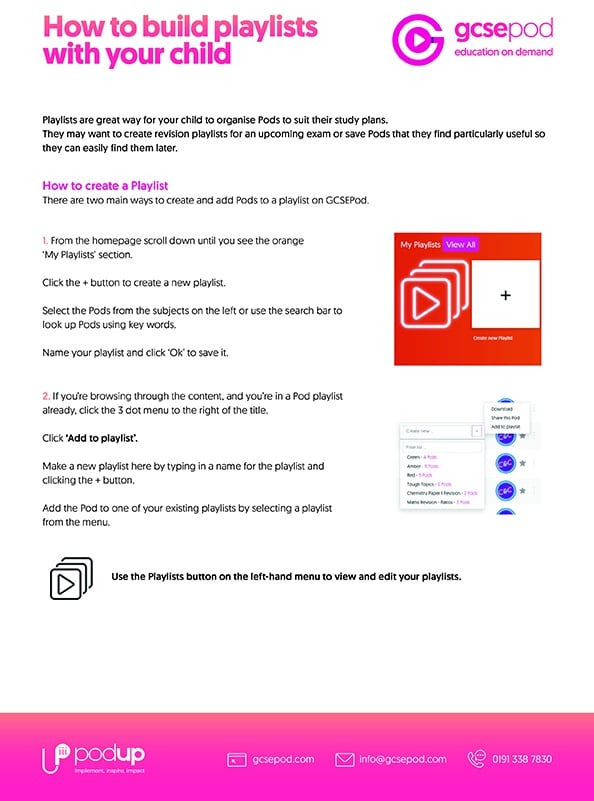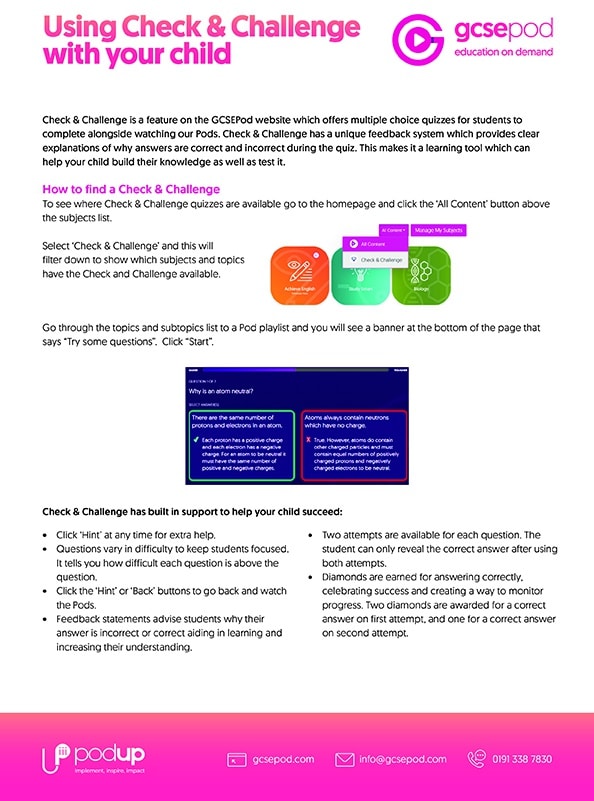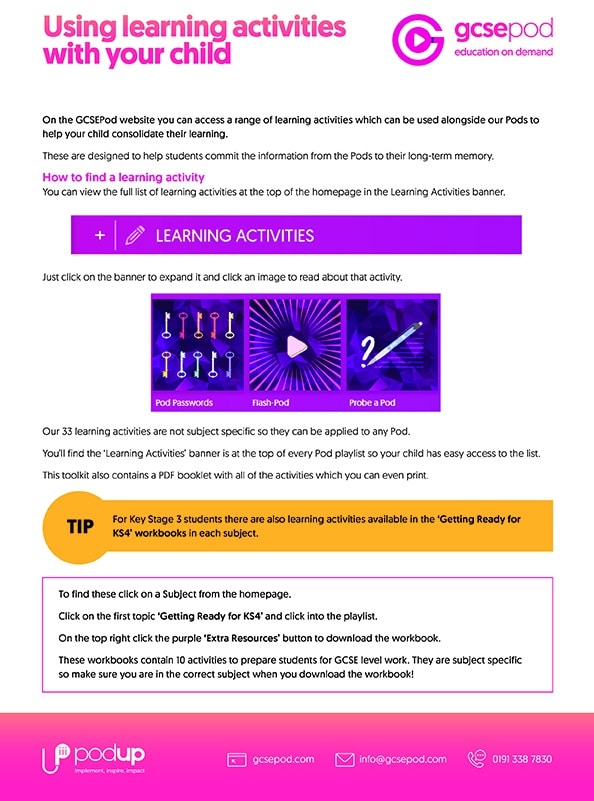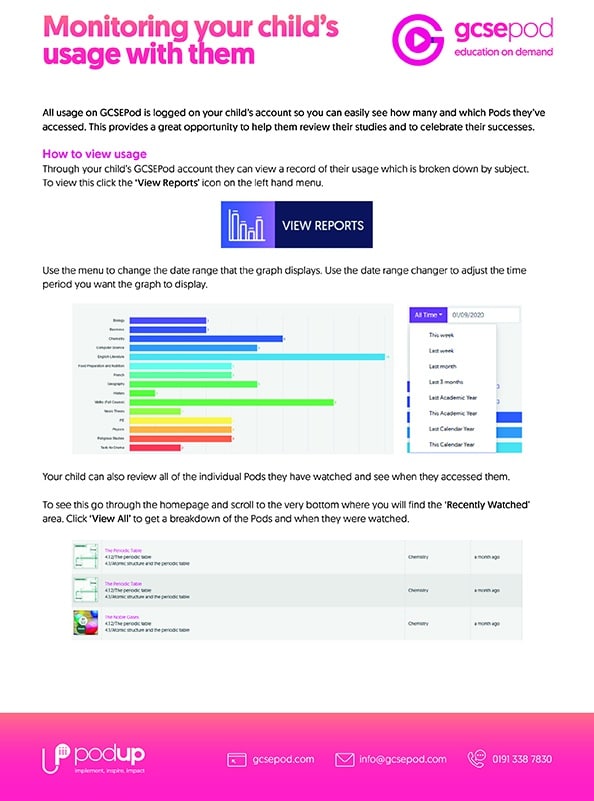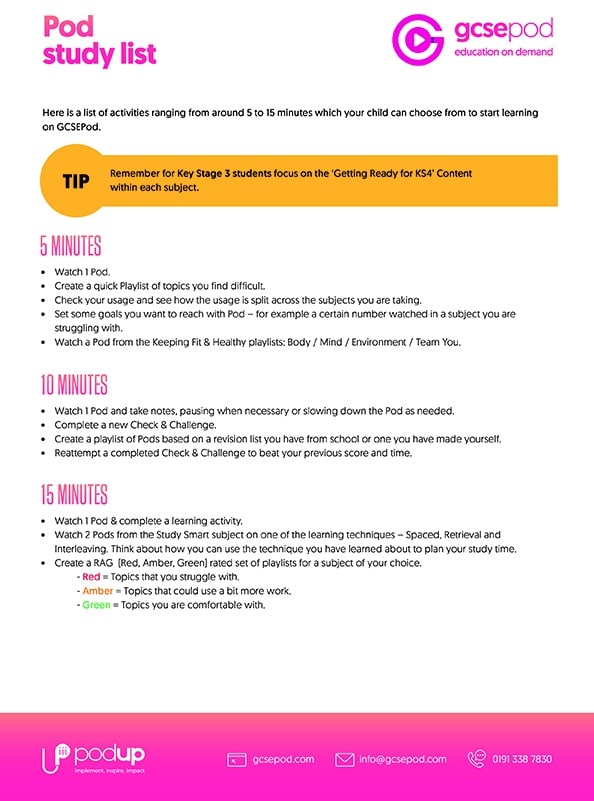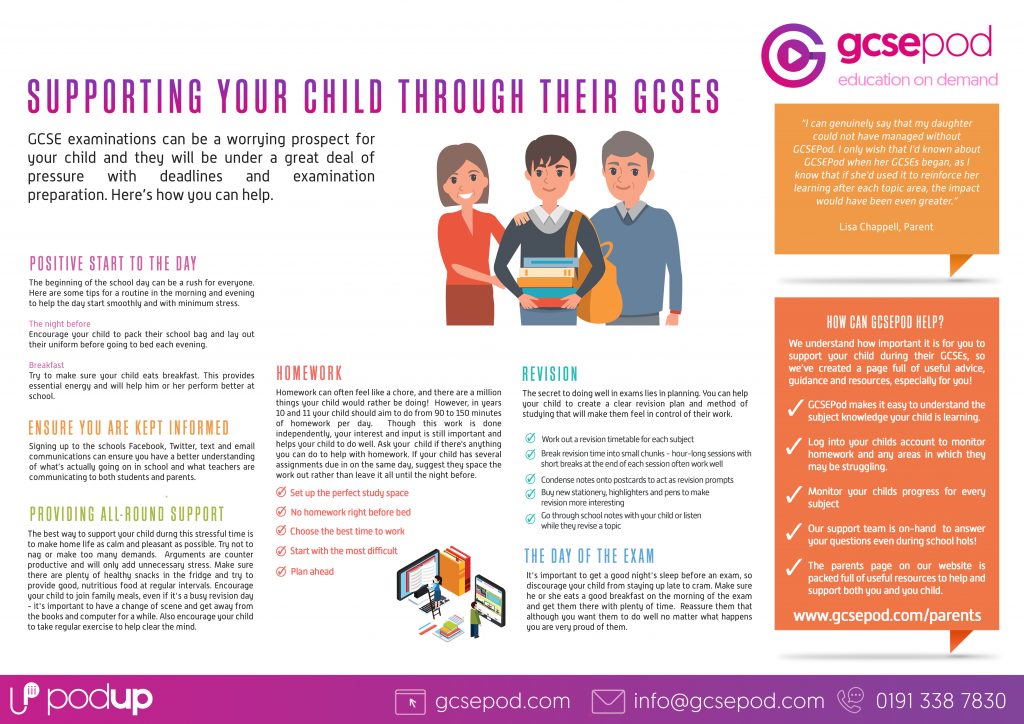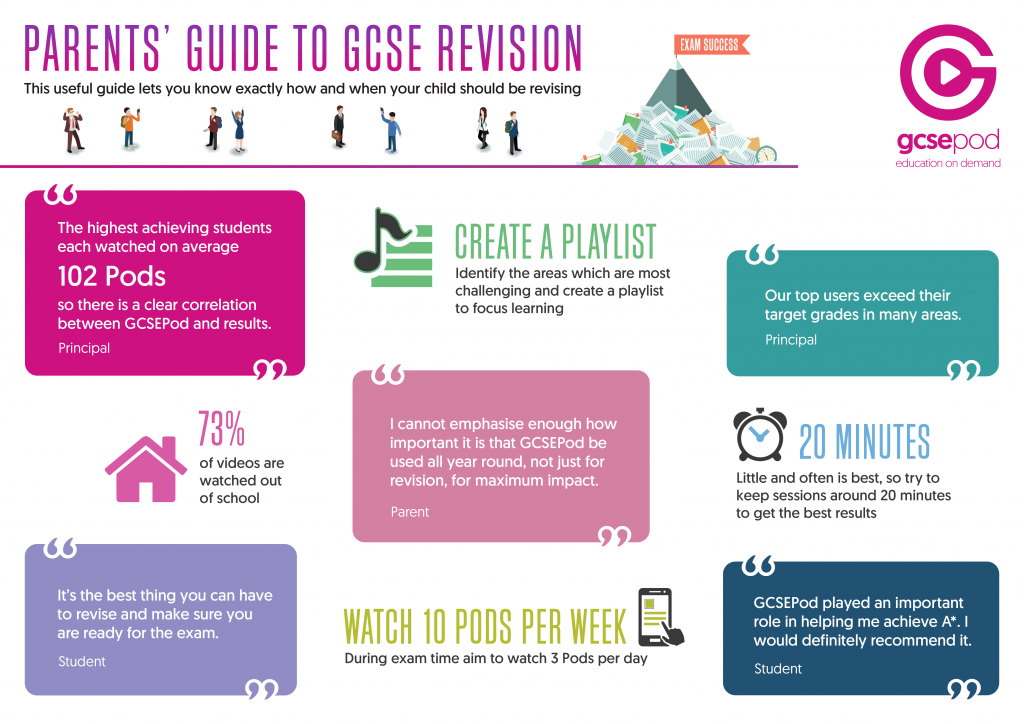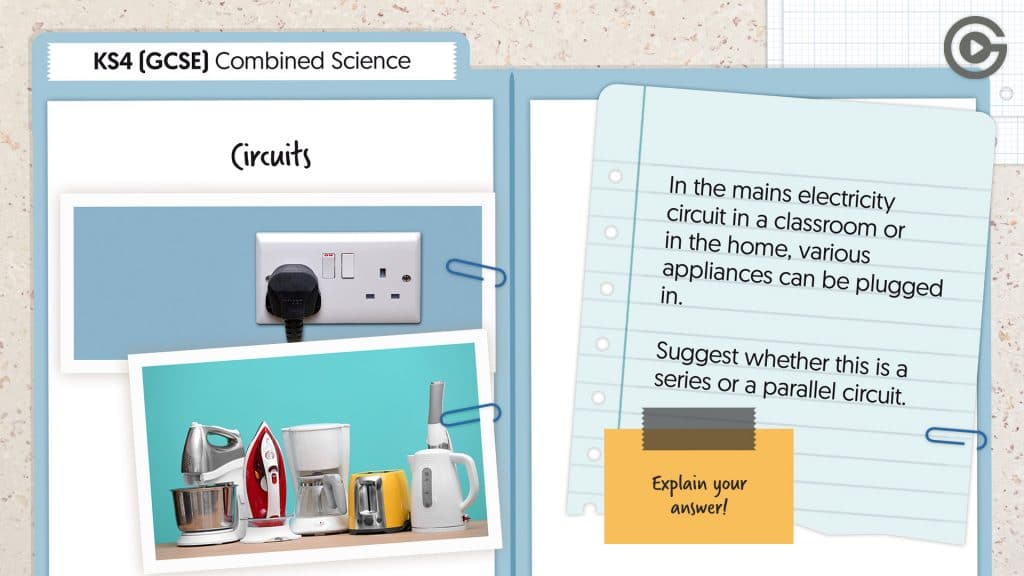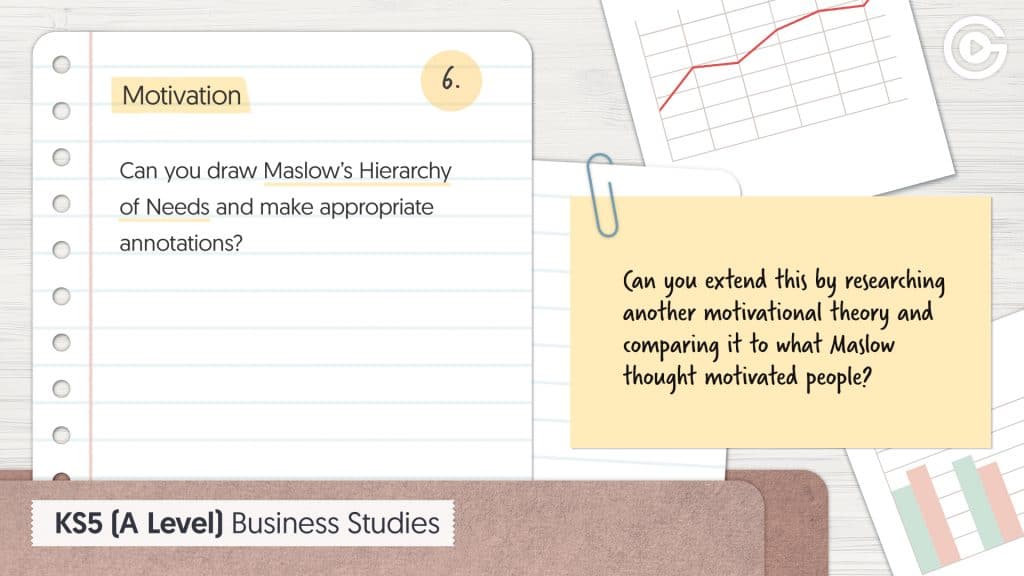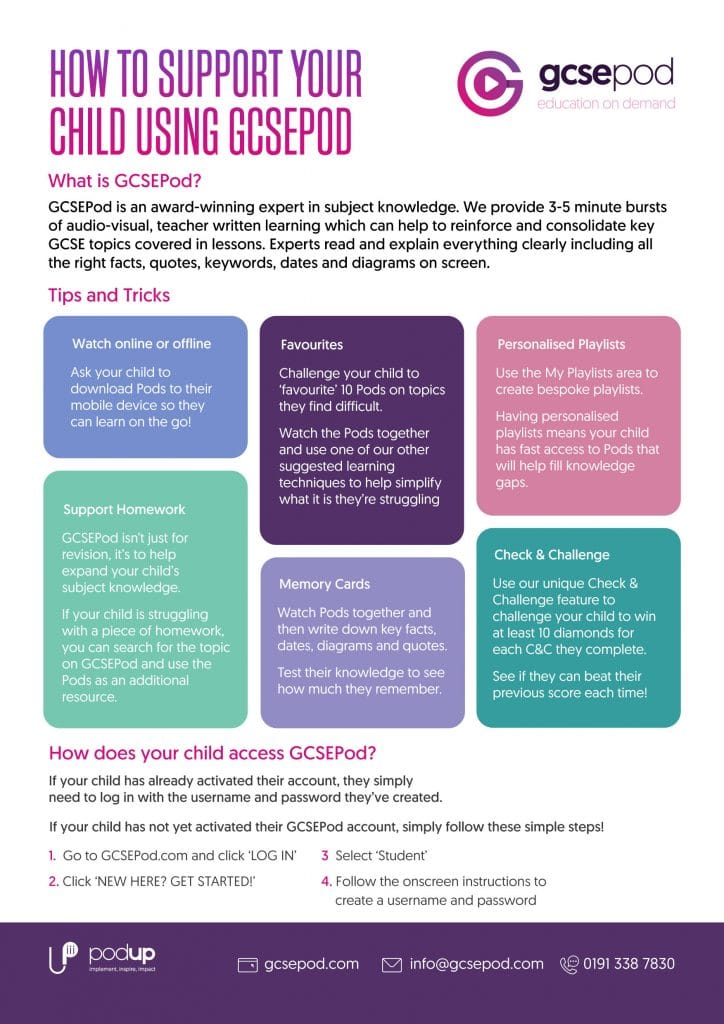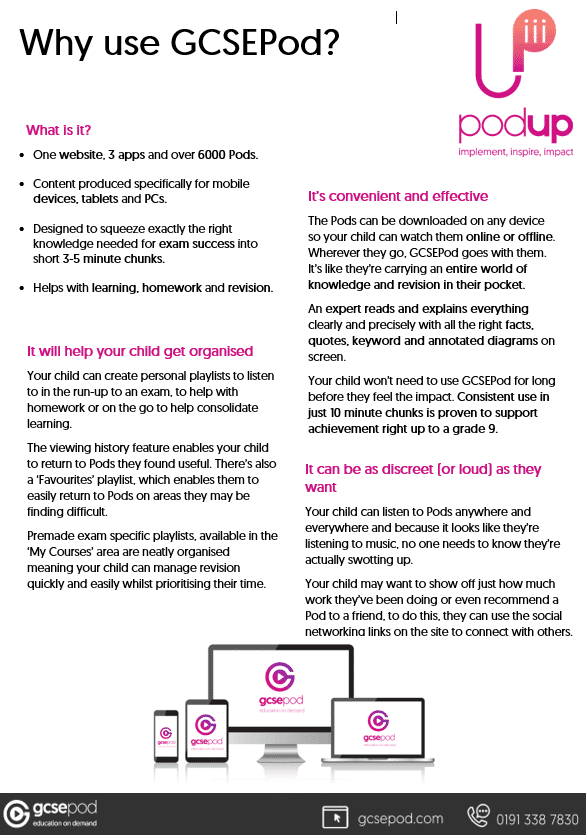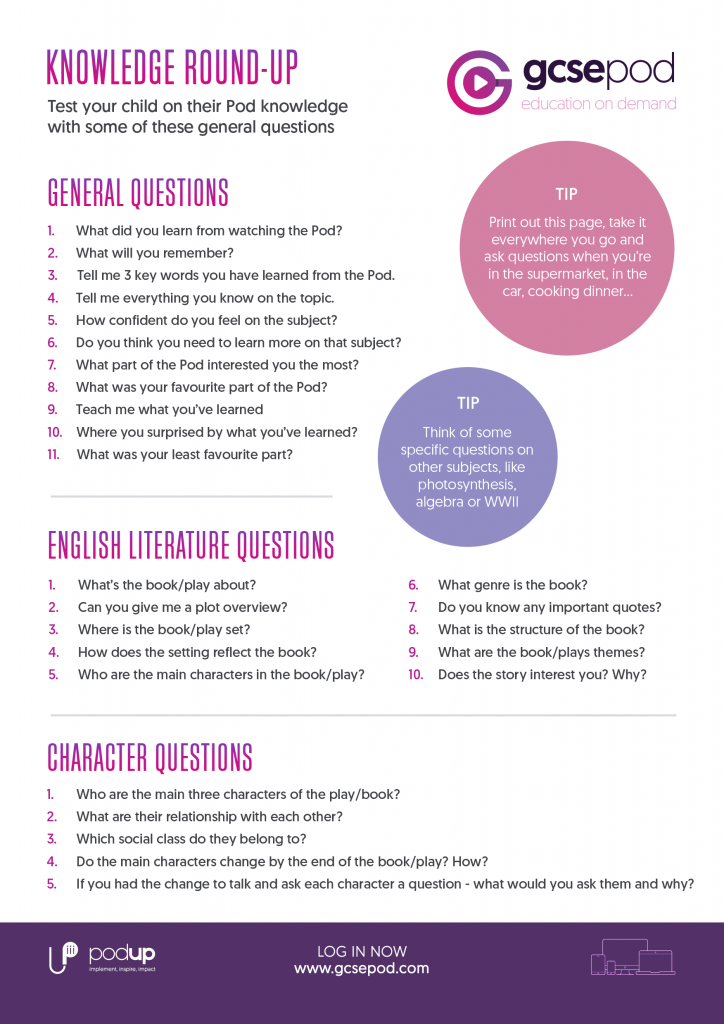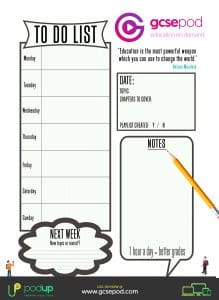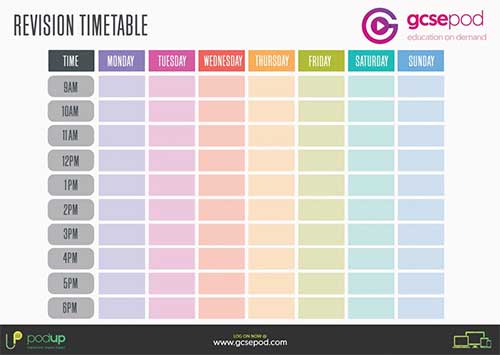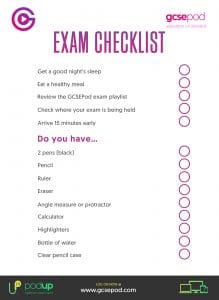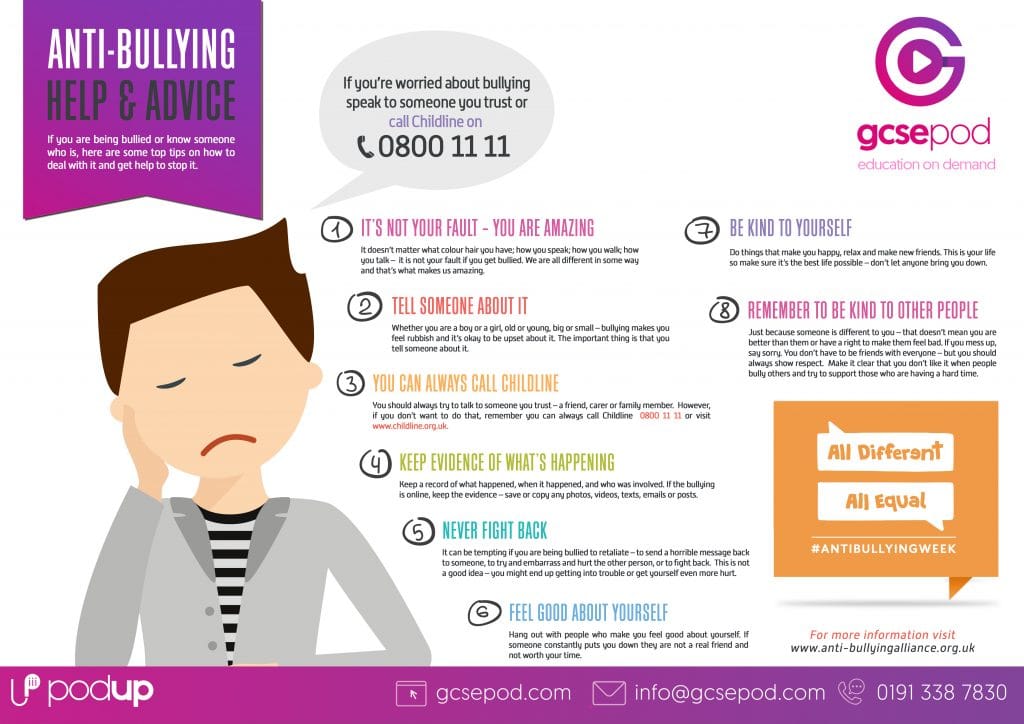We understand how important it is to support your child during their GCSEs, so we’ve created a page full of resources, especially for you. Here you can discover parent user guides and quick start guides, and you can explore how to support your child. For daily resources to support your child join us on social media…
“GCSEPod has been a game changer in terms of helping my son.”
GCSEs are a stressful time for all involved, whether you are a student, teacher or parent. For many parents, exams have changed a lot since they did them so trying to make sure their children are supported in the best way possible can be quite overwhelming. We want to put you at ease, having children in Year 10 & 11 is certainly a challenging time but just a positive and encouraging attitude from you can make a lot of difference to your child.
GCSEs are a great platform for students to use to pursue their ambitions. They require students to really hone in on their skills as independent learners; teachers cannot hold all their students’ hands through their exams. It will also be their first experience of public examinations with proper exam conditions, this can be daunting for students so it is really important they feel supported. In order to help you provide this support we have broken down all the things you need to know if you have children preparing for GCSEs.
- GCSEs, or General Certificates of Secondary Education, are examinations in specific subjects sat at the end of Year 11. They replaced O-Levels in 1988.
- The average number of GCSEs sat is 9 or 10. This can vary though according to the needs of the student. All students need to be aiming for passes in at least five subjects including English Language and Maths as this will be expected by the majority of employers and post-16 education providers.
- In 2016 the grading system changed so the familiar A*-G was replaced with the numbers 9-1. A 4 is a pass (the equivalent to a C) and 9, 8 and 7 have replaced A*-A. Being awarded a 9 is seen as the equivalent to an A**.
- One aspect of GCSEs that parents can find confusing is the different exam boards. Exam boards are responsible for organising, setting, marking and distributing exams. The exam boards do add to the ever-growing list of acronyms in education but they are nothing to be confused about. There are five of them in England, Northern Ireland and Wales:
- AQA
- OCR
- Edexcel
- WJEC (for Wales)
- CCEA (for Northern Ireland)
- Schools can choose a different exam board for each subject and they will all produce slightly different papers. They are regulated by OFQUAL to make sure they are all the same standards and have the necessary material in them.
- Students will be made aware of which exam boards they are sitting for each subject. Each board has their own website, these are all user-friendly and will have the exam dates on there when they are released and any extra details students may need to know about the exams.
Homework
Going into Year 11, students need to be encouraged to do 90-120 minutes of homework a day, this may seen like a lot but this level of work will make it a lot easier as exams come around. Though this work should be done independently, your interest and input is still important and helps your child to do well. It is also crucial they keep up their attendance to as high as possible.
Doing loads of revision on top of this isn’t entirely necessary early on in the year but 15 minutes of extra revision every school day from this point could be an extra 75 hours revision by the time exams start. That is far better than cramming!
Engage with their progress!
Having a good idea of how your child is doing at school is really important to make sure you know where they should be focussing their time. Whilst no one is expecting parents to have regular contact with all their child’s teachers, having a point of contact to check in if there are any concerns is a good idea. A form tutor could be a good start here!
Mocks
Students will have Mock Examinations in Year 11, and sometimes Year 10. The timings of these will vary from school to school but they are usually held after the Christmas holidays. Mocks are important! GCSE mocks are a vital part of the preparation process, helping students build the skills and confidence they need to succeed in their final exams.
Convincing your child to take their mocks seriously can be difficult. Here is why we think they are so important:
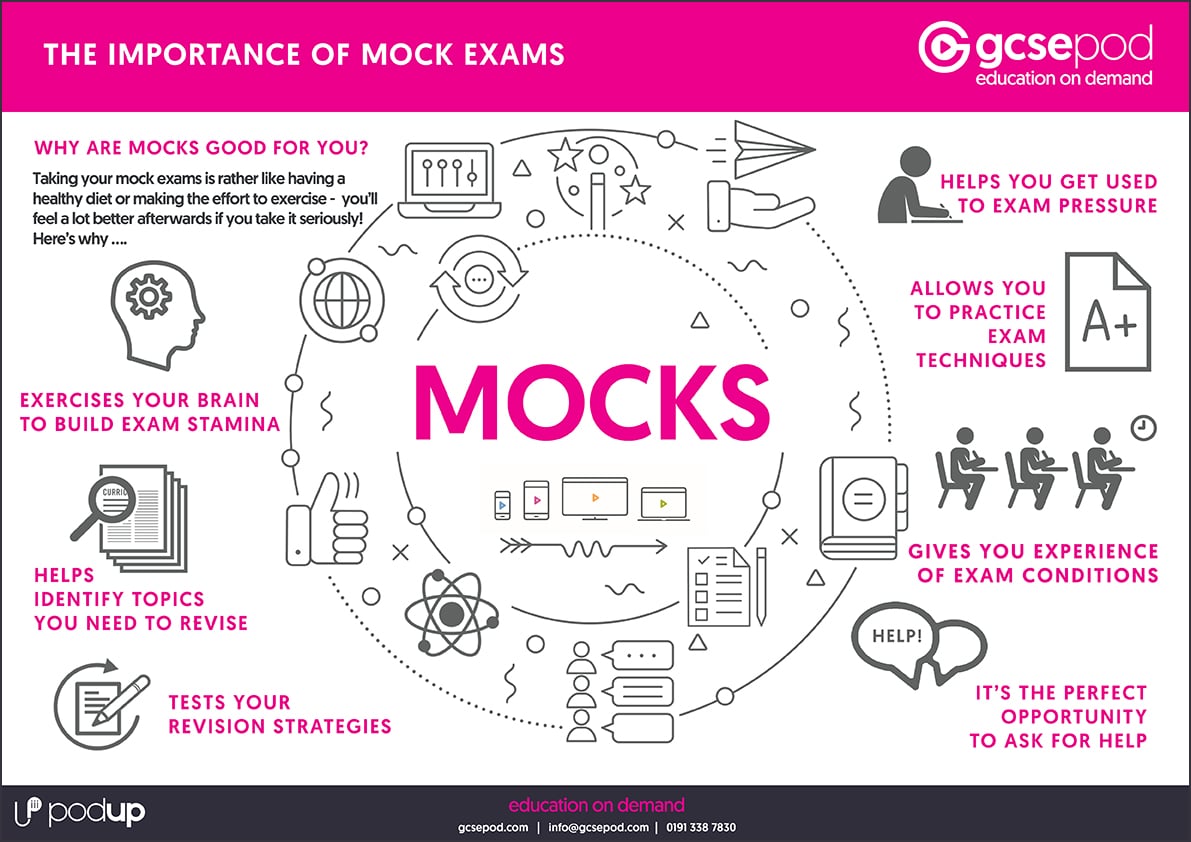
Click here to open the mocks poster
It could be a good idea to talk this through with your child as their mocks are approaching to ensure they see the value in putting in the hard work.
Revision can be an overwhelming prospect for many Year 11s. As their parents all you can do is be as supportive as you can and give them the best chance of getting the most out of revision.
When to start?
There is not a set date when revision should start but the sooner the better! By January your child should definitely be getting into the swing of revision but small boosts of revision from this point in the year can make a big difference!
Plan! Plan! Plan!
Planning is the key to success so engage and help your child do this-the days go by quickly so ensuring they get the most out of them is really important. A timetable is the best way to do this!
Things become a loss less daunting when they are broken down into small chunks. Encourage your child to break down their subjects into different topics so they can manage their progress, they will be able to tick it off a list once they have looked at it. Just putting “Science” down could mean that most of the time allotted to it is spent trying to work out what topic to concentrate on so best to already have decided this in the plan.
Below is a template your child can use to plan their weeks, they can fill in different timeslots of different length depending on what suits them:
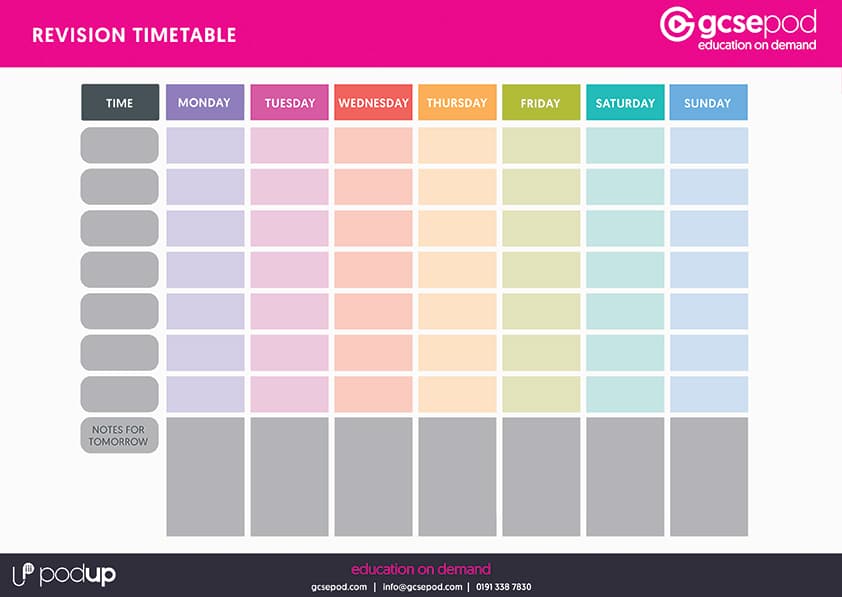
Click here to open the mocks poster
It is important that children don’t spend all day working, they will become less and less productive the more tired they get and run the risk of burning out before exam season rolls around. You can use our Revision Plan checklist to ensure the timetable is balanced and your child will get the most out of it:
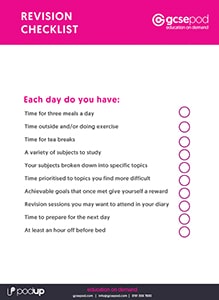
Click here to open the checklist
As time goes on priorities might change, especially when exams are fast approaching, so make sure the schedule is adaptable. Not everyday has to follow exactly the same time pattern so mix things up to keep it interesting. If you feel like your child is fading one day it is ok to encourage them to take a break or change the timetable around. There is no point them trying to stick to the plan if it isn’t working for them!
Finding the best work environment
It can’t be expected that everyone in your home’s life is put on pause whilst your child is sitting their exams so don’t feel pressure to constantly be on hand to help your child. This won’t help in the long run, growing as an independent leaner is one of the key skills students take away from their GCSEs. But making sure home life is as stress free as possible and conducive to home working is a great way of making things easier for your child.
Here are things to bare in mind:
- Make sure they have the right resources-in order to help their revision stationary or folders may be required as well as some materials being printed.
- Reduce distractions-set up a place to work which is quiet and away from technological or social distractions.
- Establish a routine-getting into a solid routine both before and after exam leave has started helps student get the most out of time allotted to revision.
- Talk about their work-engaging with what they are doing will make them feel supported. If possible, eating dinner together can be a great time to encourage your child to reflect on their day and voice any concerns.
- Give them space-don’t bombard them with questions. They need to be the ones in charge of their work so don’t stand over their shoulder!
- Limit procrastination-whether this be scrolling through their phone or reorganising their desk when it really isn’t necessary, procrastination can be one of the biggest challenges of revision. This is why it is good to set attainable goals throughout the day to stay on task!
- Encourage them to prepare for the next day the evening before-having everything ready for the day means that they can get straight into revision.
Revision techniques
Everyone learns differently so there is no right way of revising. But encouraging your child to vary the way they work is great. There are lots of really interesting developments in cognitive science which can be incorporated in revision.
Here are our three favourite techniques:
Retrieval Practice | Interleaving | Spaced Practice |
It is really important that your child is working hard because that’s what they want to do. Forcing them to revise isn’t going to help, it has to come from their own intrinsic motivation. If not, their work will probably be done with little effort and days will become unproductive. It is therefore important to draw a line between encouragement and enforcement.
Everything is going to be ok!
GCSEs are a marathon not a sprint! Keeping energy and motivation up therefore is part of it! There are going to be lots of times where things become a little overwhelming for students, particularly as exams get closer. Parents should be encouraging their children to do their best but setting targets and applying pressure is often counter-productive. Many kids just want to hear that their parents are proud of them, this could be all it takes to pick them and motivate them to keep going.
If anxieties do continually crop up there are lots of techniques you can run through with your child to try and minimise them. Really making clear to them that things will be alright regardless of the outcome so there is no problem which is going to completely derail them is important.
Things to look out for which could indicate an increased level of stress include:
- Struggling to concentrate and stay focussed
- A disruptive sleep routine and increased tiredness
- A change in behaviour which could look like higher levels of irritability or withdrawal from situations
A change of routine or environment could also help! Whether that be increasing the length of a daily walk or going to study in a cafe or library for a couple hours everyday, there should be a proactive effort to get out of a rut or problems will spiral!
On the day of the exam students can feel quite overwhelmed. Making sure they remembered everything is great way to try and calm their nerves. Here is a list of things to run through with them:
- Be Prepared:
- Get a good night’s sleep
- East a healthy meal
- Review the GCSEPod exam playlist
- Check where your exam is being held
- Make sure you have taken all your revision notes out of your pockets
- Arrive 15 minutes early
- Things to bring:
- Two black pens
- A pencil
- A ruler
- An eraser
- The necessary maths equipment
- Highlighters
- A bottle of water
- A clear pencil case
Parent Power
When parents are engaged with schools, great things happen! Evidence shows that children whose parents are engaged do better, regardless of their background, than those whose parents are not involved in their education. It also benefits the whole school community. Having an active parent body means that the school remains informed about what works best for families and also raises the standards of teaching.
We really hope parents begin to realise just how much of an impact they can have on their children’s education. Throughout lockdown there has been some fantastic examples of parent power. The school closures meant that parents were forced into taking a much more active role in their children’s education which was not easy for many families as they had to balance it with their own jobs. We hope though that the resilience shown by families over the past 18 months will act as encouragement for parents to remain involved in their children’s schooling.
Finding the tech which can work for your child
One of the biggest changes from now and when many parents sat exams at school is the development of technology. It is now embedded in everything we do. This can often be scary for parents as they are not entirely sure of the best way to approach technology and their children. Navigating the sheer scale of content out there often makes parents think the best policy is to shut their kids off from it entirely. There are so many fantastic resources online that can really enhance children’s learning potential so this is definitely not the answer! There is a wealth of content which can help with revision. The ability to communicate with friends to give each other tips and encouragement is also great!
Developing positive tech habits is really important so they do not act as distraction or cause problems.
Here is our top advice:
How can GCSEPod can help?
There are lots of great resources out there to help students prepare for their GCSEs. Trying to find tools which can provide the most cohesive support for your child can be difficult. But you need to look no further than GCSEPod! All of our curriculum content is created in-house. Our pods are 3-5 min bursts of GCSE learning, rigorously quality assured and mapped to all major GCSE and IGCSE exams boards.
Parent Webinars
Join a GCSEPod webinar and find out how you can use GCSEPod to support your child’s learning plus get tips and guidance on effective home learning practices. All your questions will be answered by a GCSEPod expert and you will learn about the best way to make full use of the resource during this time. Spaces are limited so please book your place here.
GCSEPod Parent Webinars
Join a GCSEPod webinar and find out how you can use GCSEPod to support your child’s learning plus get tips and guidance on effective home learning practices. All your questions will be answered by a GCSEPod expert and you will learn about the best way to make full use of the resource during this time. Spaces are limited so please book your place below.
Please scroll down to book your place on a GCSEPod parent/carer webinar.
Parent Toolkit
Here are the key resources you will need to use GCSEPod and support your childs learning journey. Simply click on the documents below to download them. We also have these resources in Arabic and Chinese, simply click on buttons below to download thos versions.
Guides to supporting your child through their GCSEs
GCSE examinations can be a worrying prospect for your child and they will be under a great deal of pressure with deadlines and examination preparation. Parents/Carers may find it difficult to support their children through this time. These parent guides is a list of possible strategies that may help you with this support.
Revision techniques to help your child remember more!
These useful guides are a great way to give a boost to GCSE revision sessions.
Retrieval Practice
Retrieval practice is the act of trying to recall information without having it in front of you. Practice bringing information to mind for better results. It’s a great way to understand gaps in your knowledge so you can fill them before the exam.
Interleaving
Interleaving is the theory that by revising more than one topic in each session you will make better links between them. Interleaving strengthens memory association. Repeating this process can reinforce connections and enhances learning.
Getting ready for GCSEs
Our ‘Getting Ready for GCSEs/IGCSEs’ resources are made up of a collection of activities aimed at supporting pupils to ‘have a go’ at tasks, learning and skills required for KS4.
Getting ready for A-levels
Similar to our GCSE resources, an extra workbook which helps students feel more prepared, focusing on expectations at A Level and new concepts.
Get the most out of GCSEPod
All of our curriculum content is created in-house. Our pods are 3-5 min bursts of GCSE revision, rigorously quality assured and mapped to all major GCSE and IGCSE exams boards. Use these handy resources to ensure you are getting the most out of GCSEPod.
Parents guide to encouraging good tech habits
Manage your child’s online habits with these top tips.
Planning is the key to successful revision
Keep on top of all work and be prepared for exams with these handy resources.
“I honestly cannot say how utterly BRILLIANT the gcsepod resources are…what a wonderful idea, and an absolute Godsend for the youngsters AND for us ‘poor’ parents!! A truly FANTASTIC resource for Revision and Guidance through the many many MANY Subjects/facts/figures….I really do believe that the visual approach to learning and remembering all of this information, is absolutely spot-on…PERFECT.”

